 Petzlover
Petzlover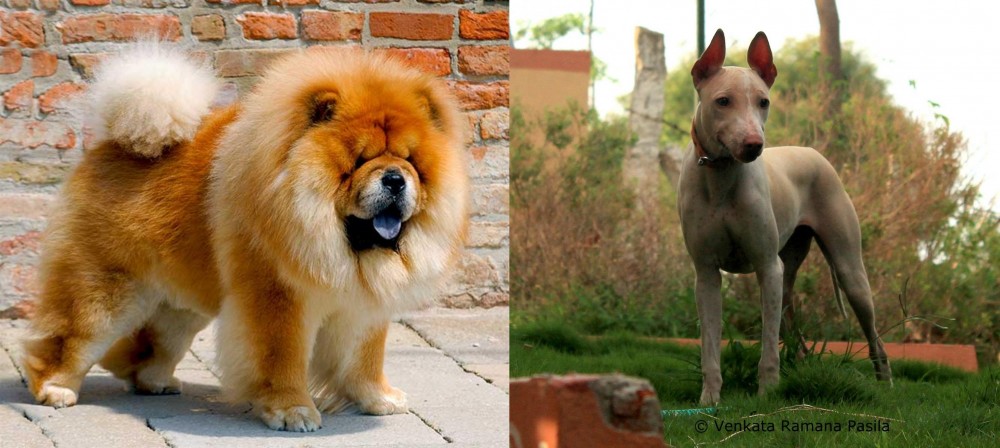 Chow Chow is originated from China but Jonangi is originated from India. Both Chow Chow and Jonangi are having almost same height. Chow Chow may weigh 11 kg / 25 pounds more than Jonangi. Both Chow Chow and Jonangi has almost same life span. Chow Chow may have more litter size than Jonangi. Chow Chow requires High Maintenance. But Jonangi requires Low Maintenance
Chow Chow is originated from China but Jonangi is originated from India. Both Chow Chow and Jonangi are having almost same height. Chow Chow may weigh 11 kg / 25 pounds more than Jonangi. Both Chow Chow and Jonangi has almost same life span. Chow Chow may have more litter size than Jonangi. Chow Chow requires High Maintenance. But Jonangi requires Low Maintenance
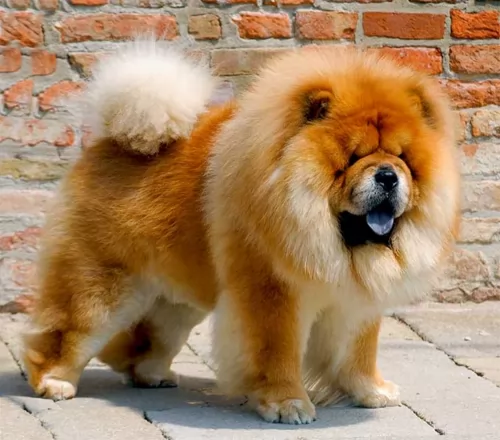 Northern China is the original home of the Chow Chow. In that region of China, the breed was known as the Songshi Quan – “the puffy-lion” dog. They have also been known in China as the “Dog of the Tang Empire” or the Tang Quan. The Chow is believed to be an ancient breed that the Foo Dog, or stone dog guardians of Buddhist palaces and temples, is modeled after. It is one of the most ancient of dog breeds that are still around today.
Northern China is the original home of the Chow Chow. In that region of China, the breed was known as the Songshi Quan – “the puffy-lion” dog. They have also been known in China as the “Dog of the Tang Empire” or the Tang Quan. The Chow is believed to be an ancient breed that the Foo Dog, or stone dog guardians of Buddhist palaces and temples, is modeled after. It is one of the most ancient of dog breeds that are still around today.
It is believed that they have existed for around 2000 years or perhaps even as far back as 3000 years, starting out in Mongolia and migrating to China. The ancientness of the Chow Chow has been validated through DNA testing. In China all those centuries ago, the Chow Chow was born to be a working dog. They hunted, herded, guarded and pulled carts. They went on quests with the Mongolian armies when China was invaded, as well as when the Mongolians invaded the Middle East and Europe later on.
Today’s Canadian Kennel Club has about 350 Chows registered while the AKC gets 10,000 new registrations every year.
 The Jonangi, known also as the Jagilam or Kolleti Jagilam is an Indian breed of dog which has always been used for hunting and herding.
The Jonangi, known also as the Jagilam or Kolleti Jagilam is an Indian breed of dog which has always been used for hunting and herding.
The dog isn’t seen abundantly in India and it isn’t recognized by any major kennel clubs in India. It isn’t recognized as a pure” breed and there is also concern that the dog is reaching extinction.
Because of interbreeding with other dogs, there is quite a bit of variation in the Jonangi breed.
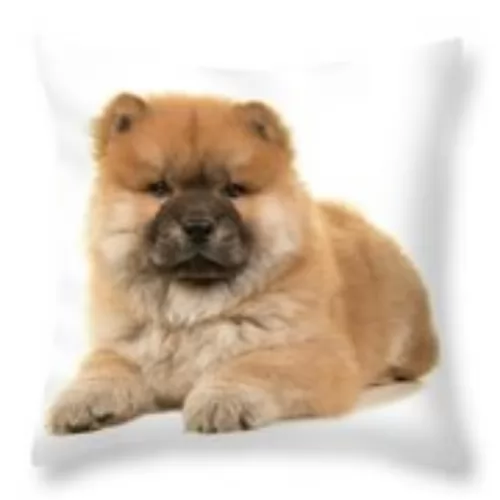 The Chow really does look like a small lion with a black tongue. The dog is sturdy and square with erect, small ears on a broad skull. They have a very dense double coat. Their eyes are deep set and look like almonds, while they all have that very distinctive purple or black tongue. Their lips are also distinctive with their blue color. The nose is black, but some Chows might have a blue nose. The tail is curly.
The Chow really does look like a small lion with a black tongue. The dog is sturdy and square with erect, small ears on a broad skull. They have a very dense double coat. Their eyes are deep set and look like almonds, while they all have that very distinctive purple or black tongue. Their lips are also distinctive with their blue color. The nose is black, but some Chows might have a blue nose. The tail is curly.
These are medium size dogs when it comes to height and weight, but they are powerfully built for their size. Their power is in their compact body holding the energy and strength of a much larger dog. Its hind legs are almost entirely straight, unusual for any dog. They get their lion appearance from the huge ruff that stands behind their heads. Their chest is broad and deep.
 The Jonangi is a medium sized dog that stands between 43 – 53cm in height and weighs between 12 and 21kg. He is lean and muscular. Because of interbreeding with the Jonangi dog, the colors of their coats can vary and be anything from fawn, white, tan, black, bi-colored or even brindle. The coat is very short and fine which helps it cope with the extreme heat of the environment.
The Jonangi is a medium sized dog that stands between 43 – 53cm in height and weighs between 12 and 21kg. He is lean and muscular. Because of interbreeding with the Jonangi dog, the colors of their coats can vary and be anything from fawn, white, tan, black, bi-colored or even brindle. The coat is very short and fine which helps it cope with the extreme heat of the environment.
The ears are erect, the forehead is often wrinkled and the long tail is held out straight or it hangs down low. The ears are fairly short and are somewhat floppy.
The Jonangi is capable of being a true family pet, becoming loyal and devoted to his human family. This isn't a particularly intelligent dog but they're even tempered, fun loving, social and easy to please.
You'll find them getting on well with other pets in the home and children too. An interesting aspect with this dog is that he seems to like digging a hole and lying in it, even preferring this to the regular dog beds you get.
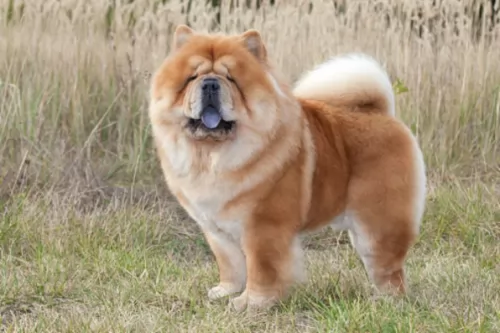 Loyal and true to their family and those they know; the Chow Chow is a little standoffish with strangers. They are very protective and usually attach themselves to one or two people. They are intelligent but stubborn, which can affect your training with them. They need to respect their people and Chows respect hose who take care of them. They can be aggressive toward dogs of their same sex especially if those dogs are the same breed as well.
Loyal and true to their family and those they know; the Chow Chow is a little standoffish with strangers. They are very protective and usually attach themselves to one or two people. They are intelligent but stubborn, which can affect your training with them. They need to respect their people and Chows respect hose who take care of them. They can be aggressive toward dogs of their same sex especially if those dogs are the same breed as well.
They are known to be very clean and many have compared them to cats in that regard. They appear to be dignified and refined. They are usually very quiet but very adaptable dogs.
 Life with a Jonangi is easy going as these aren’t finicky dogs – they’re low maintenance, easy going, fairly healthy dogs that want to please you and just be your pet.
Life with a Jonangi is easy going as these aren’t finicky dogs – they’re low maintenance, easy going, fairly healthy dogs that want to please you and just be your pet.
They make excellent companions, being loving and loyal to their human families and getting on well with other dogs and children in the home.
There are those who are trying to revive the breed, and that is a good thing as these are good natured family pets that will be a positive addition to any home.
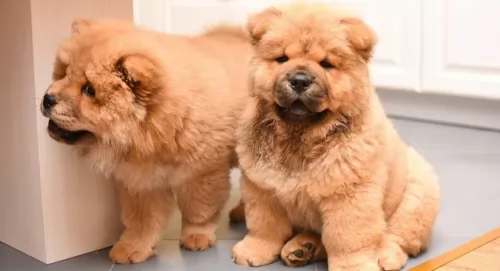 Although an ancient breed that obviously has survived many centuries of trials, the Cho Chow of today is prone to several different health conditions. These include:
Although an ancient breed that obviously has survived many centuries of trials, the Cho Chow of today is prone to several different health conditions. These include:
This condition can require surgery to keep the turning eyelid from injuring the eye ball.
This can cause lameness and arthritis.
This can cause lameness and arthritis.
Make sure you keep the ears clean and keep an eye on them.
 This dog is a robust breed, used to living under difficult circumstances. You won't find many inherited diseases with him, but still it pays to know about some of the more common dog illnesses that he might face.
This dog is a robust breed, used to living under difficult circumstances. You won't find many inherited diseases with him, but still it pays to know about some of the more common dog illnesses that he might face.
With any dog, the joints can take quite a pounding which can lead to injuries. You may notice your dog doing less and having difficulty with common activities. Your dog may even have lameness. Your vet will try to avoid surgery and look at things such as diet and weight management. There are also medications, anti-inflammatories and pain relievers.
Ear infections are common with dogs and can be caused by allergies, ear mites and bacteria in the ear canal. Your Jonangi may be tilting his head or shaking it, he may be constantly scratching his ear, he may even have lack of balance and an unpleasant odor coming from his ear because of a discharge. Take him to the vet as soon as you think he has an ear infection.
This problem which affects a dog’s lower urinary system can be totally debilitating for your dog. There are many problems which can cause this problem in your pet and which can lead to health conditions such as incontinence.
Older dogs and those with diabetes are more prone to urinary tract problems. Your dog will strain or yelp with discomfort when trying to pass urine. The urine may be very cloudy or even have blood in it and there may be dribbling of urine too. Other signs can be vomiting, lethargy, back pain, weight loss and change in appetite. See your veterinarian for immediate medical attention. It is considered a medical emergency.
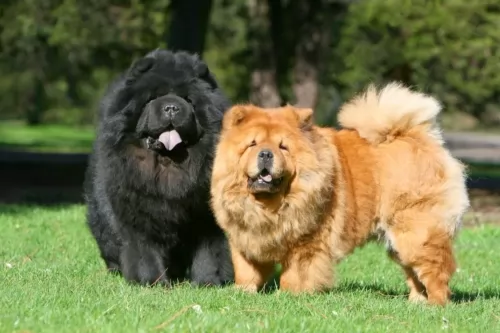 Don’t overfeed a Chow Chow as they are hard workers and big eaters. Feed them at least twice a day.
Don’t overfeed a Chow Chow as they are hard workers and big eaters. Feed them at least twice a day.
This eye disease can lead to blindness if not checked and treated.
These can be removed from an adolescent puppy.
Again, the Chow is susceptible to cancer.
Can lead to heart or kidney problems if left untreated.
Keep a close eye on your Chow Chow skin.
The Chow Chow was developed as working dog, but today’s version is more laid back and doesn’t need excessive exercise. Daily walks will suffice. They live very happily in the city if walked regularly. They are not really a competitive breed outside of obedience and confirmation. They are seldom seen in sports like agility or frisbee.
 With commercially manufactured dog food, there are companies that make quality foods that are formulated for certain conditions such as joint health. They have additives in them such as fish oils which decrease inflammation. Always look for a food that is appropriate for your dog’s age and energy levels.
With commercially manufactured dog food, there are companies that make quality foods that are formulated for certain conditions such as joint health. They have additives in them such as fish oils which decrease inflammation. Always look for a food that is appropriate for your dog’s age and energy levels.
Add in your own home-made food to his dry kibble such as cooked chicken, brown rice and pasta as well as vegetables and also try to include some raw meat into his kibble from time to time. Fresh, cool water should be available to him night and day.
With his short coat, the dog is looked upon as low maintenance. Brush him a couple of times a week to make sure the coat remains shiny. Check his eyes, ears and teeth for infections.
This dog is lean, energetic and agile. With his long strides, he likes to run over terrain sniffing and following scents. He is more suited to life in the countryside than to the city. Make sure you have a reasonable sized garden for him and meet his exercise needs by taking him on walks and playing ball and fetch games with him.